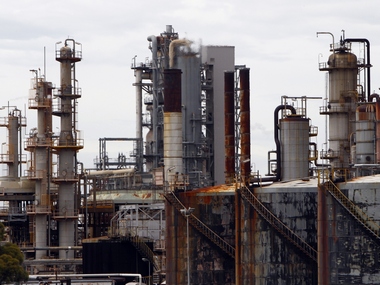The rupee traded at 55.89/90 per dollar, above its previous close of 56.08/09 as oil fell to its lowest since October 2011 on Friday to just above $100 a barrel.
Traders say a sharp fall in global oil prices was also prompting oil firms to stay out of the market. Dealers estimate if oil prices stay around current levels, it would reduce dollar demand by oil firms by nearly $2 to $3 billion per month.
This fall is attributed to weak manufacturing activity data from China and the eurozone debt crisis that raised concern of a slowdown in fuel demand.
China’s official Purchasing Managers’ Index eased to 50.4 in May, the weakest reading this year, from a 13-month high of 53.3 in April. Germany’s manufacturing sector contracted at the fastest pace for almost three years.
[caption id=“attachment_329074” align=“alignleft” width=“380” caption=“Traders say a sharp fall in global oil prices was also prompting oil firms to stay out of the market. Reuters”]  [/caption]
“This is another source of selling for oil markets, on top of China not showing much interest in stimulus,” said Jim Ritterbusch, president at Ritterbusch & Associates, of the Chinese data.
Brent crude was down $1.60 to $100.27 by today and earlier hit a session low of $100.10, its weakest since October 4. It dropped 14.7 percent in May-the biggest monthly decline since 2008.
US oil slipped $1.07 to $85.46 after losing more than 17 percent last month, also its biggest slide since 2008.
The Chinese data comes ahead of a US employment report, which is expected to show non-farm payrolls increased 1,50,000 in May from 1,15,000 in April. Some saw scope for disappointment in the report.
“I don’t think Friday’s numbers are going to be any better. It’s been a dismal week so far, and we haven’t hit bottom,” said Ritterbusch.
“We’re going to see more downside pressure on prices, with Brent likely to drop below $100 and WTI expected to dip further to around $83.”
Brent’s premium against US crude was at $14.83. High US inventories have been weighing on the US benchmark.
US crude inventories rose much more than expected last week to hit their highest level since July 1990, the US Energy Information Administration (EIA) said.
Oil also came under pressure as worries mounted about the euro zone debt crisis.
The European Central Bank stepped up pressure on Thursday for a joint guarantee on bank deposits across the euro zone, saying Europe needed new tools to fight bank runs as the bloc’s debt crisis drives investors to flee risk
Reuters


)
)
)
)
)
)
)
)
)



